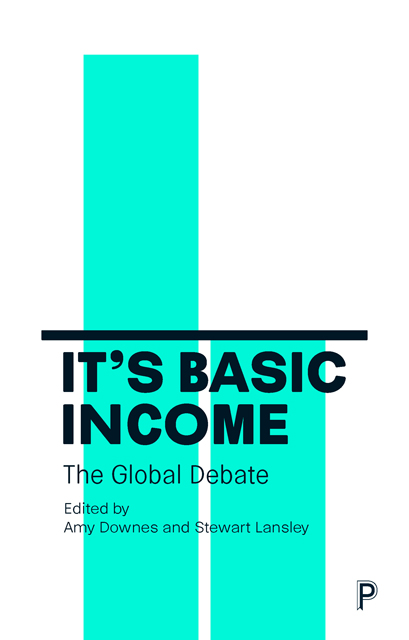27 - A Scottish pilot
Published online by Cambridge University Press: 11 April 2023
Summary
‘Reports in the media often give the impression that the Scottish Basic Income Project is a done deal, and about to happen immediately – as if by magic. This belies the fact that very important preparatory work has still to be carried out during the planning phase. It is crucial to its success that this preparatory work is well thought through and thorough.’
Interest in basic income (BI) has been increasing steadily in Scotland in recent years. The Scottish Green Party presented a costed BI scheme in August 2014. A Scottish think-tank, Reform Scotland, produced a scheme for Scotland. Although the Scottish National Party (SNP) passed a resolution in favour of BI at its 2016 conference, the SNP government has not yet adopted it as policy. The Scottish Greens included a scheme in its 2017 general election manifesto.
In November 2015, Fife Council published a report on poverty entitled Fairer Fife, which included a brief statement of its willingness to host a pilot. In May 2016, the economist Guy Standing, who had played an important role in the Namibia and Indian pilots, was invited to give the Angus Millar Lecture in Edinburgh, hosted by the Royal Society for the Encouragement of Arts, Manufactures and Commerce (RSA) in Scotland.
In the meantime, the Citizen’s Basic Income Network Scotland (CBINS), formed in late 2015, held a launch meeting in Govan, Glasgow, on 26 November 2016. During a panel session, Glasgow Councillor Matt Kerr’s announcement that Glasgow Council would also host a BI experiment was greeted with great excitement. Matt has gathered together a cross-party group of councillors to progress this plan. The meeting was such a success that CBINS organised a second launch in conjunction with Fife Council in January 2017, attended by many local people.
Both Fife and the City of Glasgow Councils have cross-party support for a BI experiment, and both have delegated responsibility to council officials to progress it further, avoiding any potentially-conflicting party political influences. Each has been supported by a think-tank. City of Glasgow is supported by RSA in Scotland, which is supportive of a BI. Jamie Cooke, head of RSA in Scotland, and Sandra McDermott, Director of Financial Inclusion for Glasgow Council, have initiated several meetings on BI in Glasgow for third sector organisations and ordinary citizens, including benefit recipients.
- Type
- Chapter
- Information
- It's Basic IncomeThe Global Debate, pp. 145 - 149Publisher: Bristol University PressPrint publication year: 2018



